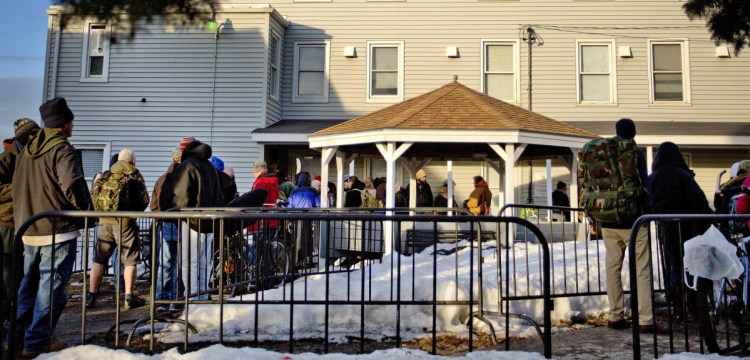It’s easy to understand why people who live in Portland’s Bayside neighborhood feel like they are under attack.
Incidents of open drug use and sales, fights in the streets, public defecation and outdoor sex are being reported regularly in a neighborhood that has become a de facto social service hub for a large portion of the state.
The depth and complexity of the problems were documented in the Maine Sunday Telegram story “Bayside at rock bottom” (May 6), but the causes of them are less apparent.
We are seeing the results of having an administration in Augusta that doesn’t believe in a public role in the fight against poverty. It might look like a neighborhood problem, but what’s happening is much bigger than Bayside.
A PRIORITY ON CUTS
Since taking office in 2011, Gov. LePage has made cutting anti-poverty spending a top priority. Cast in the language of tough love, LePage and his health and human services commissioner, Mary Mayhew (now a Republican candidate for governor), said they were ending dependency by cutting health care, housing and nutrition services and that would inspire former recipients to look for work. Thanks to a slow-moving national recovery, Maine has one of the lowest unemployment rates in its history.
So what’s happened to problems of poverty that LePage said would be cured by employment?
By almost every measure, they have gotten worse.
More than 40,000 Mainers lost their health insurance coverage in LePage’s welfare reform programs.
Those people would be among the 80,000 who would get coverage if the governor and a cadre of Republicans in the House of Representatives hadn’t been successful in blocking the largely federally funded expansion of Medicaid.
The consequences of that decision have played a role in Maine’s persistent shortage of substance-use disorder treatment options as the number of overdose deaths doubled between 2014 and 2017, reaching 418 last year. As bad as that is, the death toll tells only part of the story. For every drug user who dies of an overdose, there are many others who cannot get into treatment because the state considers them to be “able-bodied” and not “truly needy.” Some have undiagnosed mental health issues and without medical coverage, have no options for treatment.
Even though homeless people, including those with drug use and mental disorders, come from every county in the state, the city of Portland is responsible for running and maintaining the Oxford Street Shelter in Bayside. For 30 years, it was funded in partnership with the state, but under LePage that changed and Portland taxpayers were forced to shoulder more of the operating costs.
The LePage years have also seen cuts to anti-poverty programs, such as Temporary Assistance for Needy Families and the Supplemental Nutrition Assistance Program (or “food stamps”).
DEEP POVERTY
The result has been more poverty and hunger, especially for children. The rate of children in deep poverty (less than $800 a month income for a family of three) has increased 13.6 percent in Maine since 2011, while it’s declined 4.2 percent nationally.
Maine is obviously not the only place in America that experiences homelessness and poverty. But it is a good example of what happens to these problems when you try to wish them away: Even in a strong economy, they get worse.
One neighborhood should not have to pay the price for the rest of the state to learn such an obvious lesson.
Send questions/comments to the editors.



Success. Please wait for the page to reload. If the page does not reload within 5 seconds, please refresh the page.
Enter your email and password to access comments.
Hi, to comment on stories you must . This profile is in addition to your subscription and website login.
Already have a commenting profile? .
Invalid username/password.
Please check your email to confirm and complete your registration.
Only subscribers are eligible to post comments. Please subscribe or login first for digital access. Here’s why.
Use the form below to reset your password. When you've submitted your account email, we will send an email with a reset code.